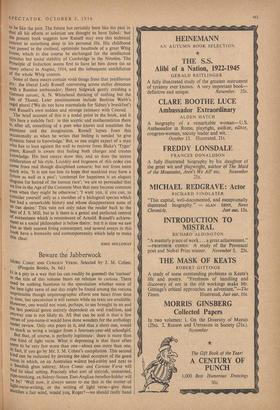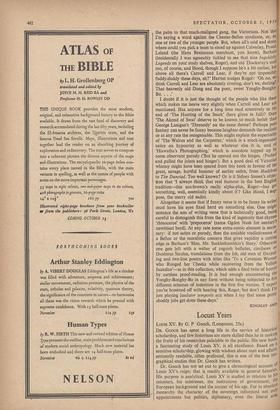Beware the Jabberwock
MORE COMIC AND CURIOUS VERSE. Selected by J. M. Cohen. (Penguin Books, 3s. 6d.) !:1- is a pity in a way that (as can readily be guessed) the 'curious' in the title of this volume bears no relation to curiosa. There need be nothing facetious in the speculation whether some of the best light verse of our day might be found among the various Unprintable though unpornographic efforts one hears from time to time, but speculation it will remain While no texts are available. However, one would not want, perhaps, to see brought to an end the last poetical genre entirely dependent on oral tradition, and anyway one is not likely to. All that can be said is that a few verses of you-name-it would have done wonders for the anthology tinder review. Only one poem in it, and that a short one, would so much as wring a snigger from a fourteen-year-old schoolgirl. Rut that of course, is perfectly legitimate there is more than one kind of light verse. What is depressing is that there often went. to be very few more than one—about one more than one, In fact, if you go by Mr. J. M. Cohen's compilation. This second kind can be indicated by devising the ideal occupant of the guest room in which, on an Australian walnut bed-tubby and next to Swedish glass ashtray, More Comic and Curious Verse will Lind its ideal setting. Precisely what sort of sixtyish, unmarried, pipe-smoking, ex-Sidney-Sussex East-Anglian-benefice-holder will ,11.e be? 'Well now, it always seems to me that in the matter of light-verse-writing, or the writing of light verse—give those matches a fair wind, would you, Roger?—we should really hand the palm to that much-maligned gang, the Victorians. Not that I'm saying a word against the Chester-Belloc syndicate, or, et, one or two of the younger people But, when all's said and done, where could you pick a team to stand up against Calverley, Praed, Leland (the Hans Breitmann merchant, you know), Barbara (incidentally I was agreeably tickled to see that nice IngoldsbY Legends on your study shelves, Roger), and old Thackeray's stuff too, of course, and Hood, though I suppose he's a bit earlier, but above all there's Carroll and Lear, if they're not impossiblY fuddy-duddy these days, eh?' Harriet nudges Roger : 'Oh no, we think Carroll and Lear are absolutely riveting, don't we, darling? That heavenly old Dong and the poor, sweet Yonghy-BonghY' Bo. . .
I doubt if it is just the thought of the people who like them which makes me heave very slightly when Carroll and Lear art mentioned. Has anyone for a long time read attentively to the end of 'The Hunting of the Snark' (here given in full)? Does The Akond of Swat' deserve to be known so much better than George Lanigan's 'Threnody' on the same theme? Perhaps pure fantasy can never be funny because laughter demands the realistic or at any rate the recognisable. This might explain the superioritY of 'The Walrus and the Carpenter,' which is a mock-ingenuous satire on hypocrisy as well as whatever else it is, and ni 'Hiawatha's Photographing,' which is anecdote topped up hY, some observant parody (`But he opened out the hinges, /Pushed and pulled the joints and hinges'). But a good deal of Victorian whimsy might have been spared from this book in favour of the great, savage, hurtful humour of earlier satire, from Hudibras to The Dunciad. Too well known? Or is it Sidney Sussex's objec' Lion that 'I always think that real humour in the best English tradition—this nut-brown's really alpha-plus, Roger—has got something, well, essentially kindly about it'? Like Hood, I SUP' pose, the merry old sadist.
Altogether it seems that if funny verse is to be funny its writer must have his eyes fixed hard on something else. One might Instance the aim of writing verse that is technically good, being careful to distinguish this from the kind of ingenuity that rhymes 'rhinoceros' with 'prepoceros' (name Ogden Nash for century s unwittiest bard). At any rate some extra-comic element is needs: sary: if not satire or parody, then the amiable vindictiveness of a Belloc or the moralistic concern that gives vapidity a cutting edge in Barham's 'Hon. Mr. Sucklethumbkin's Story.' Otherwise one gets left with a welter of roguish ballades, clerihews on Diodorus Siculus, translations from the Ish, old men of Darjeel' ing and two-line poems with titles like 'To a Covetous Woman who Rouged her Cheeks while recovering from the Yellogi Jaundice'—as in this collection, which adds a final twist of horror by careless proof-reading. It is bad enough encountering the Yonghy-Bonghy-Bo in any form without being subjected to five different schemes of indention in the first five stanzas. 'I expect you're browned off with hearing this, Roger, but don't think nil just playing laudator temporis acti when I say that sonic pretty shoddy jobs get done these days.' KINGSLEY AM'S



















































 Previous page
Previous page